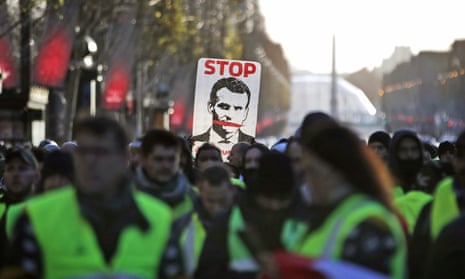The French are unhappy with their lot. What’s new? France has a tradition of noisy public protest dating back 50 years to the 1968 student uprising in Paris – and before that, to the revolution of 1789. It’s normal. So why view the current wave of anti-tax, anti-government protests any differently?
The reasons for doing so are many and urgent, for this phenomenon is not confined to France. The gilets jaunes (yellow vests), as the demonstrators are known, represent the majority of people, predominantly working and lower middle class, who in countries across Europe feel betrayed by a political elite and an economic system that ignores their needs. The existential problem that poses for all democracies is obvious.
Those who interpret the anger directed at Emmanuel Macron, France’s young president, simply as vindication of the strategies of the left fool themselves. This is not about conventional left-right politics; this is about their destruction. Those on the right who seek to exploit the unrest should be warned. As Daniel Cohn-Bendit, leader of the 1968 uprising, says in today’s Observer, it is but a short step from here to authoritarianism and the potential overthrow of democracy itself.
The gilets jaunes share many of the fears, insecurities and alienation that helped produce, in Britain, a majority for Brexit; that in Italy have led to the installation of an ugly, hard-right nationalist government; that in Germany fatally undermined the chancellorship of Europe’s leading moderate, Angela Merkel; and that have encouraged, in Poland, Hungary, Austria and elsewhere the advance of intolerant, xenophobic populist parties. When this majority rebelled, the result, in the US, was Donald Trump.
As the French author Christophe Guilluy has argued, these protests have their epicentre not in “globalised metropolises” such as Paris, London and Berlin, but in Europe’s peripheral, marginalised and de-industrialised regions, small- and medium-sized towns, and rural areas. The common story here, at a time of increased national wealth overall, is one of declining employment, economic insecurity, rising poverty, declining services, lack of opportunity – and yes, burdensome taxes.
These popular majorities are victims of economic inequality and cultural relegation, caused chiefly by globalisation. Wealthier, better-educated, city-based elites have gradually separated from the popular hinterland, of which they are ignorant and unaware. The result? A silent grassroots fury that today, in France, has found its voice. By donning yellow vests, the protesters ensured they are visible once again.
For Macron, as for other European leaders, there are no easy answers. The protesters’ aims are numerous and inchoate: lower taxes, higher wages, cheaper energy, better pensions, a halt to irksome school “reforms” and, in some cases, a new president. The movement has no leaders with whom to negotiate; it lives and organises, for the most part, on social media platforms; and, as is evident from the violent clashes in Paris, it has been too easily hijacked – including by far-right groups bent on overthrowing an elected government.
Macron has made mistakes he can try to rectify. He has already revoked the fuel tax rise that sparked the explosion. Other conciliatory measures may follow. Improved communication between rulers and ruled is essential; he will address the nation this week. But some things are harder to fix. Macron has failed to deliver the mould-breaking “revolution” he promised. One of his first moves was to abolish France’s ineffective wealth tax, making him an easy target for the “president of the rich” tag. He has squandered the goodwill that propelled him to power last year. His reputation for being out of touch and arrogant is deserved.
Polls suggest the protests may have peaked in terms of numbers. Public support has dropped, although still high at 66%. A majority disapproves of the violence. Here are the seeds of survival. Macron must hold his nerve and absorb the lessons. France needs more listening and less leading. And the president needs to come down a peg or three.
